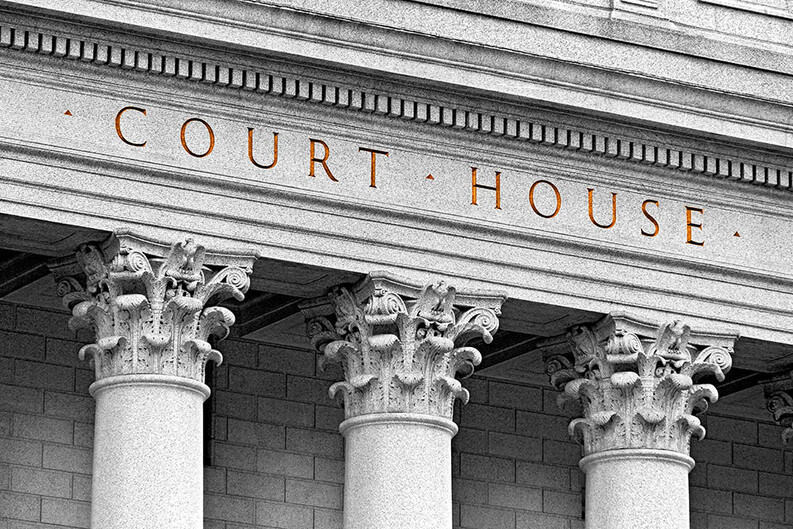New Federal Suit Filed Against VA on Behalf of Veterans Exposed to Radiation at Palomares Nuclear Cleanup

Edward P. Feeley, a U.S. Air Force veteran who was exposed to radiation at the 1966 nuclear disaster cleanup in Palomares, Spain, filed suit on November 1, 2021 in the U.S. Court of Appeals for Veterans Claims. The lawsuit asks the court to order the Secretary of Veterans Affairs (VA) to expedite Feeley’s administrative appeal and to allow it to proceed as the first-ever agency class action before the Board of Veterans’ Appeals. The Veterans Legal Services Clinic at Yale Law School represents Feeley in the lawsuit.
“The Board can, and must, resolve the claims of this class of veterans. Feeley and other Palomares veterans are in their 70s and 80s, and many have life-threatening illnesses,” said Sarah Purtill ’22, a law student intern in the clinic. “They do not have years to wait while the VA individually delays, denies, and appeals their claims.”
In 1966, the U.S. Air Force ordered Feeley and approximately 1,400 other U.S. servicemembers to clean up radioactive plutonium debris after a B-52 bomber carrying four nuclear warheads crashed with a fueling tanker in midair over Palomares, Spain. Like many Palomares veterans, Feeley now experiences a radiation-related disability. The VA initially denied his claim, as it has done with nearly all other Palomares veterans, according to the lawsuit.
In June 2021, Feeley asked the Board to hear his legal challenge on behalf of all Palomares veterans with diseases specific to radiation-exposure, and in August he moved to expedite his case.
Many other federal agencies aggregate claims, but the Board concluded that disabled veterans must litigate their administrative appeals one by one and can never join together in a collective action. The Board also refused to hear Feeley’s challenge to the exclusion of Palomares from the VA’s list of recognized radiation-risk activities. The November 1 filing in federal court is the latest effort by Palomares veterans in their five-decade struggle for recognition.
“My fellow veterans and I spent weeks at Palomares, shoveling nuclear waste without gloves or masks. We ate there and slept there. At the end of the day, we would be covered in a white powder — which I later learned was radioactive debris. I was only 20 years old when I arrived at Palomares, and I’m 76 now. Most of the men I served with are older than me. Many of them have passed away since that time and the ones that are still alive deserve to have their service rewarded,” said Feeley.
The lawsuit states that because the VA does not properly recognize the Palomares nuclear disaster as a radiation-risk activity, veterans involved in the cleanup lack clear access to service-connected disability benefits, even if they suffer from conditions that the VA otherwise acknowledges as radiogenic, such as Feeley’s non-Hodgkin lymphoma. Feeley is also a member of a separate class action certified by the Court of Appeals for Veterans Claims, Skaar v. McDonough, challenging the scientific validity of methodology that the VA uses to evaluate Palomares veterans’ claims instead. A 2020 ruling in the case4 found that the VA had not fulfilled its legal responsibility to determine whether the method it uses to assess the veterans’ radiation exposure is scientifically sound. The clinic also serves as counsel for the class in the case.
“Too many service members have already died without access to the compensation and treatment they earned for their efforts at Palomares. As the oldest surviving member of the U.S. Air Force testing team at the Palomares accident site, for me this delay has been especially conspicuous,” said Victor Skaar, the named plaintiff in that case.
“The veterans of the 1966 Palomares nuclear disaster have waited over half a century for recognition of their radiation-connected illnesses. Until now, their appeals to the VA have been in vain. Vietnam Veterans of America has fought for the VA to recognize and appropriately compensate and treat all wounds, disabilities, and illnesses resulting from military service — including toxic wounds caused by exposure to chemicals and radiation,” said John Rowan, National President of Vietnam Veterans of America.
“There is little doubt that the nuclear accident in Palomares has caused cancer and other diseases in veterans like Feeley who were callously and carelessly sent in by Department of Defense officials to clean up radioactive material without adequate protective gear or warning of severe health risks,” said Sen. Richard Blumenthal ’73 (D-CT), sponsor of the Palomares Veterans Act of 2021. “Despite clear evidence of the connection, here we are 55 years on and the VA still will not recognize the radiation risks at Palomares, cutting off benefits and health care for these deserving veterans. We must honor their selfless sacrifice, and ensure that all those that helped to clean up that disaster are recognized through an expedited review process and provided with the treatment and resources they deserve.”
The Veterans Legal Services Clinic5, part of the Jerome N. Frank Legal Services Organization at Yale Law School, represents veterans and veterans’ organizations in individual and national litigation and regulatory and legislative reform efforts.


